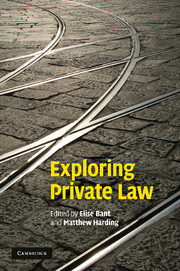Book contents
- Frontmatter
- Contents
- List of Contributors
- Foreword
- Acknowledgments
- Table of Cases
- Table of Legislation
- Introduction
- I Method
- 1 Do top-down and bottom-up reasoning ever meet?
- 2 Internationalization or isolation: the Australian cul de sac? The case of contract law
- 3 The Australian law of restitution: has the High Court lost its way?
- 4 Privacy and private law: developing the common law of Australia
- 5 Towards legal pragmatism: breach of confidence and the right to privacy
- 6 Teaching trust law in the twenty-first century
- II Unjust enrichment
- III Equity and trusts
- IV Remedies
- Index
- References
3 - The Australian law of restitution: has the High Court lost its way?
Published online by Cambridge University Press: 10 November 2010
- Frontmatter
- Contents
- List of Contributors
- Foreword
- Acknowledgments
- Table of Cases
- Table of Legislation
- Introduction
- I Method
- 1 Do top-down and bottom-up reasoning ever meet?
- 2 Internationalization or isolation: the Australian cul de sac? The case of contract law
- 3 The Australian law of restitution: has the High Court lost its way?
- 4 Privacy and private law: developing the common law of Australia
- 5 Towards legal pragmatism: breach of confidence and the right to privacy
- 6 Teaching trust law in the twenty-first century
- II Unjust enrichment
- III Equity and trusts
- IV Remedies
- Index
- References
Summary
Introduction
When I first taught the BCL restitution course in Oxford in the late 1980s and early 1990s, and when I first came to Australia in 1994, we looked across with admiration, and not a little envy, at the wonderful judgments on the law of restitution of the High Court of Australia. We were enthralled by the decisions and reasoning in cases such as: Pavey & Matthews Pty Ltd v Paul, rejecting the implied contract theory and awarding a quantum meruit for work done under an unenforceable contract; David Securities Property Ltd v Commonwealth Bank of Australia allowing restitution for mistake of law and recognizing the change of position defence; and Commissioner of State Revenue (Vic) v Royal Insurance Australia Ltd rejecting a passing on defence to a claim for restitution of mistakenly overpaid stamp duty. At that time Australia led the way in its development and application of a principled law of restitution and England lagged woefully behind.
How times have changed. The English law of restitution over the last fifteen years has seen the most remarkable transformation. The reasoning of the courts at all levels has been characterized by rigorous and enlightened analysis. The growth has been accelerated by two dramatic bursts of litigation, factually so fortunate for the law of restitution: the swaps litigation in the mid-1990s; and more recently, and ongoing, the so-called Hoechst litigation on the consequences of the striking down of UK advanced corporation tax legislation by the European Court of Justice.
- Type
- Chapter
- Information
- Exploring Private Law , pp. 67 - 85Publisher: Cambridge University PressPrint publication year: 2010
References
- 1
- Cited by



